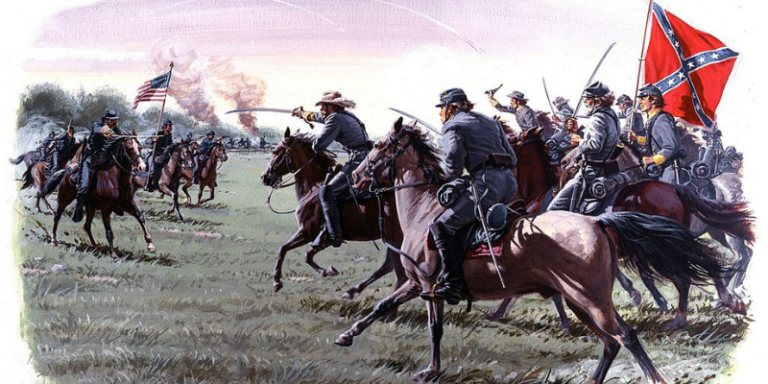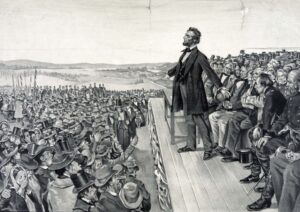Gettysburg: The Beginning of the End for the Confederacy
Gettysburg was the Confederacy’s last chance to win foreign support.
By: Kelli Ballard | March 7, 2021 | 667 Words

(Illustration by Ed Vebell/Getty Images)
“Four score and seven years ago our fathers brought forth on this continent, a new nation, conceived in Liberty, and dedicated to the proposition that all men are created equal.”
~ Gettysburg Address / Abraham Lincoln
The Battle of Gettysburg is considered one of the most important engagements of the Civil War. Not only do scholars believe it was the turning point in the war, but it was also one of the bloodiest skirmishes of the time, and it is what inspired President Abraham Lincoln’s famous Gettysburg Address.
After beating the Union’s Army of the Potomac, Confederate General Robert E. Lee Pushed north to Gettysburg, Pennsylvania. He had two main hopes for this invasion of the North: Get the attention and support of Great Britain and France and move the fighting out of the South.
On July 1, 1863, one of the Confederate divisions went into the town in search of supplies only to realize that General George Meade’s Union cavalry brigades had already arrived a day before. The southern troops were able to push the northern soldiers out of town to Cemetery Hill, about a half-mile to the south.
Winfield Scott Hancock arrived and set up a strong defensive line along the Cemetery Ridge, also known as Little Round Top, while more Union corps came in overnight. The next day, Lee ordered his army to attack the Federal troops. The battle that ensued throughout most of the day resulted in about 9,000 deaths on both sides, bringing the total to 35,000 in just two days.
On July 3, the final day of the battle, Lee pressed on. He sent George Pickett, with less than 15,000 troops, to attack the Union infantry. The troops marched in open fields while the northern armies fired at them from behind the protection of stone walls. The march, known as “Pickett’s Charge,” ended with the loss of nearly two-thirds of the men from Pickett’s troops and a staggering half of the Confederate Army. On July 4, Lee expected the Union troops to attack, but they never did so he and his remaining army left the area in defeat.

(Photo by Universal History Archive/Getty Images)
On November 19, 1863, President Lincoln delivered one of the most powerful speeches in history in only 272 words:
The Gettysburg Address
“Four score and seven years ago our fathers brought forth on this continent, a new nation, conceived in Liberty, and dedicated to the proposition that all men are created equal.
“Now we are engaged in a great civil war, testing whether that nation, or any nation so conceived and so dedicated, can long endure. We are met on a great battle-field of that war. We have come to dedicate a portion of that field, as a final resting place for those who here gave their lives that that nation might live. It is altogether fitting and proper that we should do this.
“But, in a larger sense, we can not dedicate — we can not consecrate — we can not hallow — this ground. The brave men, living and dead, who struggled here, have consecrated it, far above our poor power to add or detract. The world will little note, nor long remember what we say here, but it can never forget what they did here. It is for us the living, rather, to be dedicated here to the unfinished work which they who fought here have thus far so nobly advanced. It is rather for us to be here dedicated to the great task remaining before us — that from these honored dead we take increased devotion to that cause for which they gave the last full measure of devotion — that we here highly resolve that these dead shall not have died in vain — that this nation, under God, shall have a new birth of freedom — and that government of the people, by the people, for the people, shall not perish from the earth.”
Abraham Lincoln
November 19, 1863
















